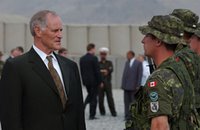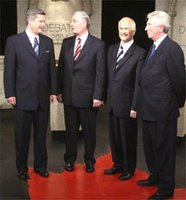Wanted: a federalist strategy for Québec
 The new Liberal ads in Quebec certainly don't seem to be going over very well. Apparently, the ads show two hockey teams - one Liberal, and one Bloc - and are designed to paint the BQ as a one-issue party, concerned only with sovereignty. And it also pokes fun at Gilles Duceppe's idea for a Québec hockey team. I haven't actually seen the ads, but the stills found on CTV certainly aren't very flattering - they look cheaply-made and juvenile. And the premise of the spot seems equally stupid to me - I can really imagine too many wavering Québec voters being bowled over by the ads and jumping to the Liberal ship. At any rate, the response to these ads is not going well for the Grits. And it doesn't seem to be getting any better. Over on Cyberpresse, there's an article that notes some anger at the ads coming from one Yvon Leduc, the director-general of the Ligue nationale d'improvisation (National Improvisation League), who argues that the Liberals have stolen the idea for the spots from him and some of his colleagues. I'm not sure if the story has made it into the English press yet but it certainly won't help matters. If anything, it'll give the BQ campaign more traction.
The new Liberal ads in Quebec certainly don't seem to be going over very well. Apparently, the ads show two hockey teams - one Liberal, and one Bloc - and are designed to paint the BQ as a one-issue party, concerned only with sovereignty. And it also pokes fun at Gilles Duceppe's idea for a Québec hockey team. I haven't actually seen the ads, but the stills found on CTV certainly aren't very flattering - they look cheaply-made and juvenile. And the premise of the spot seems equally stupid to me - I can really imagine too many wavering Québec voters being bowled over by the ads and jumping to the Liberal ship. At any rate, the response to these ads is not going well for the Grits. And it doesn't seem to be getting any better. Over on Cyberpresse, there's an article that notes some anger at the ads coming from one Yvon Leduc, the director-general of the Ligue nationale d'improvisation (National Improvisation League), who argues that the Liberals have stolen the idea for the spots from him and some of his colleagues. I'm not sure if the story has made it into the English press yet but it certainly won't help matters. If anything, it'll give the BQ campaign more traction.I admit that I'm not really finding the Liberal strategy in Québec to be terribly convincing. Calling it a de facto referendum doesn't seem to me at all to be a good idea, because it's very likely that the BQ will get more than 50% of the vote regardless of the fearmongering. Paul Wells writes well on the subject over here. This, coupled with Paul Martin's unappetizing theories on assymetrical federalism rub me completely the wrong way and leave me believing that the current Liberal team has no idea how to fight Québec separatism and is terrified, preferring instead to fire randomly in all directions until something works. How comforting. That being said, I don't really see anyone nationally (except perhaps Bernard Lord) who has the moral authority or intellectual capacity to make and lead a strong case for the future of Québec within Canada. One of my greatest fears is that Québec will separate from this country - I've told my Québecois friends here at school that countless times. It's so frustrating to see Canada's federalists floundering about with misguided tactics and stupid television ads that will likely lose more votes than they gain.
Oh well. C'est la vie, I suppose. If anyone finds a good federalist strategy for Québec, let me know.








